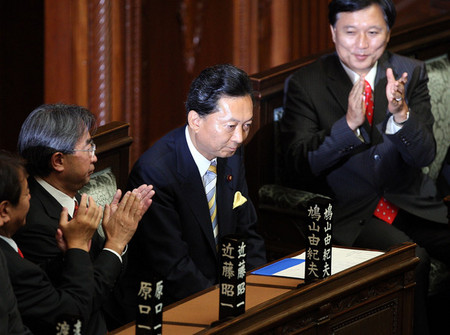
“The Japanese,” writes Masaru Tamamoto, “are a people who endlessly and fruitly ask who they are.”
If this is the case, then the dramatic re-shaping of their political landscape has provided the Japanese (and everybody else) a rich new opportunity to indulge in their national pastime.
The country’s new prime minister Yokio Hatoyama (a.k.a. “the alien“) and his Democratic Party of Japan (DPJ) elbowed their way past the country’s half-century old political status-quo to seize power with an overwhelming mandate in last month’s election.
With America’s political and economic influence on the wane, China on the rise, and the global economic system still in a state of tentative rehab, the new administration finds itself presented with an intriguing opportunity to re-define (or at least, restate) its regional and international role.
For virtually its entire post-war history, Japan has been a paragon of what would now be termed “responsible global stakeholdership,” albeit one nestled securely under the wing of American protection. Anti-war, anti-proliferation, pro-market, the country threw its weight firmly behind developing a system of global norms and institutions at a time when most countries were more busy squaring off on opposite sides of the iron curtain.
But at a time when the importance of a truly internationalized global order is more clear than ever, Japan’s role as its main trailblazer is looking a little wobbly. Junichiro Koizumi’s decision to support America’s 2003 invasion of Iraq without a UN mandate marked the start of a gradual shuffle in the direction of becoming a more unilateral, interest driven, “normal” country. The Bush administration talked hopefully of turning the country into “Asia’s Britain,” while at the fringes of domestic politics, a long-dormant brand of chauvinist nationalism began to carve a niche for itself once more.
Unfortunately, assertiveness abroad has been matched with apathy back home. China’s rapid expansion has led some to suggest that the best the country can hope for is to retire gracefully as the region’s Canada. But years of indifferent and sometimes outright catastrophic economic performance have left many Japanese with much gloomier expectations; according to one recent survey, Japan’s business executives are the most pessimistic in the world when appraising their future prospects.
Although they have been criticized by some for being a little fuzzy round the edges, there is hope that the Hatoyama administration’s fresh set of policy offerings could go some way toward arresting this sense of drift. An ambitious program of expanding the country’s safety net should give domestic consumption the required kick in the pants, while a more integrationist approach in Asia is back in step with the fine Japanese tradition of institution-building, albeit in a new and more local guise.
It’s too early to say where all this will end up. Without anybody to fill its boots, U.S. military influence in the Pacific is likely to remain a deciding factor in regional geopolitics for some time to come. Still, the prospect of a regional free trade pact raised at this week’s meeting between China, Japan and Korea is an encouraging step. In an increasingly multipolar world, Japan could certainly do worse that end up as Asia’s Brussels.
Japan’s future international role will be the subject of an event at the New America Foundation tomorrow Monday, October 12 from 12:15pm – 1:45pm featuring David Shorr, Weston Konishi and Steve Clemons.
The speakers will discuss Japan in the context of Powers and Principles: International Leadership in a Shrinking World, a new book on global governance.
This event will stream live here at The Washington Note.
— Oliver Lough


5 comments on “Guest Post by Oliver Lough: Asia’s Britain, Asia’s Canada…Asia’s Brussels?”